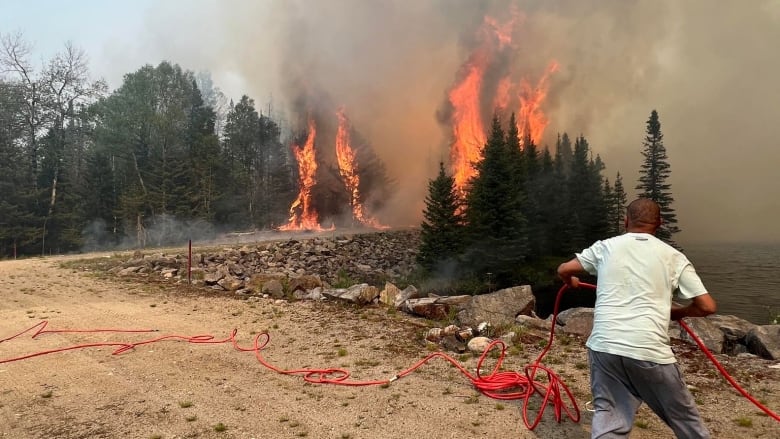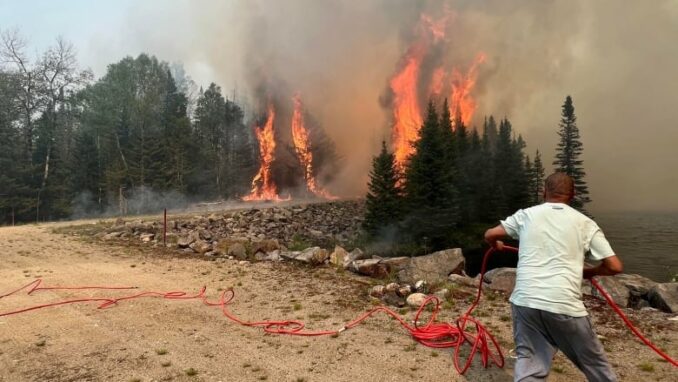

Barriere Lake Nation wildfire. (Photo: Wendy Ratt)
Across the northern part of North America, wildfires continue to rage, threatening Indigenous lives and nations and poisoning the air for tens of millions of people. Originally clustered in the First Nations occupied by Western Canada, the fires have spread across the country, with blazes reported as far east as the 13 First Nations in the province known as Nova Scotia. As of June 7, at least 423 wildfires are burning, of which authorities have said at least 246 are out of control.


Algonquins of Barriere Lake First Nation lands, Quebec, Canada. (Photo: Wendy Ratt)
So far this year, at least 2,200 wildfires have burned over 9.39 million acres of Indigenous land. This is the worst year for Canadian wildfires on record. (foxweather.com, June 5)
The wildfires continue to devastate First Nations and Métis communities, whose on-reserve citizens remain at disproportionately high risk from wildfires compared to other Canadian residents. Over the past month, thousands of Indigenous people have evacuated; many of them continue to go without electricity, clean water and adequate shelter. (The Narwhal, Aug. 10, 2021)
Recently, the fires have spread to the Algonquins of Barriere Lake and the Lac Simon Anishinaabe First Nation, forcing the residents to evacuate. As of June 6, the Kitigan Zibi Anishinabeg Nation was also preparing to evacuate.
“It’s devastating at the moment,” said Casey Ratt, Chief of the Algonquins of Barriere Lake Nation in a June 6 Canadian Broadcasting Corporation interview. “We don’t know which way the fires will go because of the winds. We’re surrounded by fires in the north, east, west. It’s just a scary time for our community.”
Residents and volunteers who have not yet evacuated report lacking access to masks and other basic safety protections. Canadian authorities have closed the Barriere Lake Nation’s nursing station, leaving those still in the area at risk.
Ratt said, “We can’t get any masks from [the station] or any type of medical services should something happen to our community members.”
Sign on fence in Chippewa Nation, recently evacuated. (Photo: Amber Bracken)
Smoke from the fires has smothered Canada and has blanketed the U.S. Northeast. Air quality alerts remain in effect across both regions, affecting at least 90 million people in the U.S. and Canada. During the week starting June 5, the New York and New Jersey area experienced the heaviest smoke in the U.S. Northeast.
New York – worst air quality on Earth
On June 7, New York registered having the worst air quality of any city on Earth. Pictures and videos taken that day show the city shrouded in an orange-colored smog that blotted out the daylight and made the streets and buildings unrecognizable.
According to health experts, breathing New York City’s polluted air for 24 hours is equivalent to smoking six cigarettes a day. This pollution disproportionately affects low-wage workers, the elderly, people with disabilities, immunocompromised people and unhoused people, and young children.
On June 8, the smoke moved south, covering Washington, D.C., which also ranked for a time as one of the world’s worst cities for air quality. (cnbc.com, June 7)
Despite the dire risks the smoke poses, New York City Mayor Eric Adams’ administration has kept schools and businesses open and delayed a day before distributing masks or any other forms of protection. These policies are endangering the lives of hundreds of thousands of workers, children and members of other at-risk communities.
Adams’ inadequate response reveals once again the inability of the capitalist state to respond to public health crises, such as the ongoing COVID-19 pandemic, which continues to infect, disable and kill thousands of people. (Curbed, New York Magazine, June 8)
Given this, it is hardly surprising that the ruling class has taken no meaningful action to address the climate catastrophe causing wildfires to rage around the planet.
Instead, in much of the world dominated by imperialism, corporate fracking, oil drilling and pipeline projects continue to devastate the lands of Indigenous people, who protect over 80% of Earth’s biodiversity. Canada, a global hub for the mining and fossil fuel industries, is one of the planet’s largest CO2 emitters, releasing over 675 million metric tons of carbon dioxide every year. (worldometer.com, 2016 figures)
Instead of acknowledging the systemic causes of the climate disaster, the bourgeois media tries to “greenwash” capitalism by touting neoliberal “market solutions,” such as privatized wind farms, nuclear power plants and mass electric vehicle (EV) production. Yet all these “miracle” technologies, supposed to “save” the planet, rely on the exploitation of Indigenous lands and resources that are destroying the planet.
As Canada’s ongoing wildfire outbreak makes clear, the system of capitalist settler colonialism, which is causing the climate crisis, cannot solve it. To truly combat this crisis, the millions of workers affected by climate change must stand in revolutionary solidarity with Indigenous nations around the world, as they fight to dismantle settler colonialism and take back their stolen lands.
The epic struggle of the Palestinian people against the full weight of U.S. imperialism and…
The following report comes from the Bronx Anti-War Coalition organizers on a protest held in…
In the Canadian federal elections held on April 28, the Liberals won with 169 seats…
The following is Part 2 of a talk given by the author to a meeting…
Boston Students, professors and workers are confronting the Trump administration’s fascist crackdown at universities across…
Philadelphia Within days of Swarthmore students reviving a pro-Palestinian encampment on April 30, police arrested…